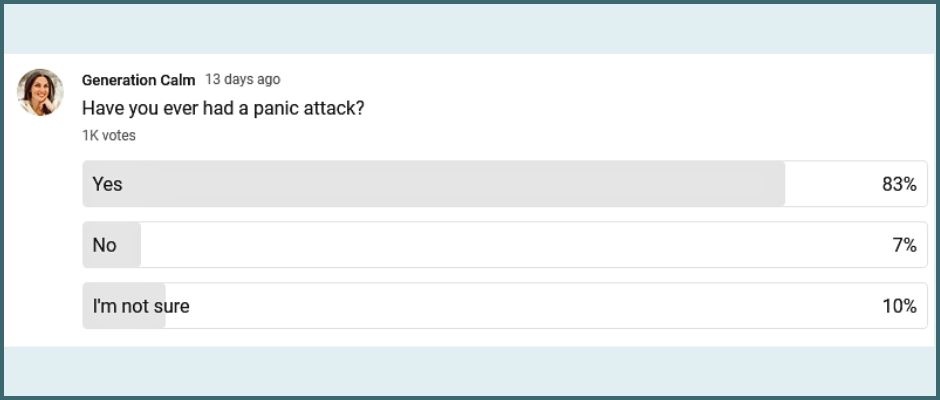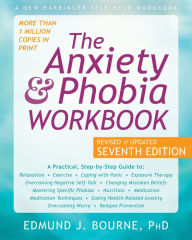How Do I Know I’m Having A Panic Attack?
Eileen never missed our anxiety management group at the local community center.
Outside, the unusually hot spring day had people taking off their coats, whereas inside, the air conditioning blasted through the gigantic hall. A small circle of uncomfortable chairs punctuated the middle of the events hall. And off to the side, stood a few of the participants chatting over a cup of tea and biscuits.
As the assistant psychologist, part of my responsibility was to engage in casual conversation with the participants as they arrived, creating a welcoming atmosphere. The elderly members of this group took pride in plying me with chocolate digestives. And on my small salary, I was a willing recipient.
On this day, Eileen had been catching up with the others as normal. But as the meeting started, Eileen looked uncomfortable. Something seemed off and as the meeting progressed, she frantically removed her cardigan and hurried out into the corridor.
Concerned, I followed her out to the chairs lined up outside the room like a headmaster’s office. Taking a seat beside her as she rummaged through her bag I watched as she located a bottle of medication and discreetly placed a small white pill under her tongue. Her quick movements evaporated, and a sense of calm washed over her.
I gently inquired about her well-being. It was in this quiet space, away from prying eyes, that Eileen confided in me. “I don’t know if I’m having a panic attack or if it’s my heart.” Knowing that Eileen had a history of heart problems, and despite her protests, I called 999 and asked for an ambulance.
Panic Attack vs Medical Crisis
Panic attacks have an uncanny resemblance to heart problems! Your heart races, your quick, shallow breaths can cause dizziness, and quickly the overwhelming sensation of losing control engulfs you. And it begs the question, how do I know I’m having a panic attack?
Knowing for certain whether you’re experiencing a panic attack can leave even a mental health professional scratching their head. Which is why you should always get your physical health checked out first.
There is no test for a panic attack. But having a chat with your G.P. is a good place to start, so they can give you a physical exam and possibly follow up with bloodwork to rule out any underlying physical causes.

Understanding Panic Attacks
Once a panic attack is triggered, the set of symptoms are fairly universal. Here is a list of common symptoms associated with panic attacks:
- Intense and overwhelming feelings of fear or impending doom
- Rapid heartbeat or palpitations
- Chest pain or discomfort
- Shortness of breath or difficulty breathing
- Feeling lightheaded or dizzy
- Sweating or chills
- Trembling or shaking
- Nausea or stomach discomfort
- Sensation of choking or difficulty swallowing
- Hot flashes or sudden changes in body temperature
- Numbness or tingling sensations, often in the hands or feet
- Feeling detached from oneself or a sense of unreality (derealization)
- Fear of losing control or going crazy
- Fear of dying
- Hyperventilation or feeling like you can’t catch your breath
- Dry mouth
- Muscle tension
You likely won’t experience all of these symptoms during a panic attack. And many of the sensations are physiological so it can be difficult to tease it apart from a physical cause.
Despite the alarming sensations, it’s important to remember you are not dying. You are not in imminent danger. Instead, you can calm yourself down by taking some slow breaths.
But it’s important not to diagnose yourself. Speak to your doctor first. Hypothyroidism, heart issues and high blood sugar can all create similar symptoms and physical causes have to be ruled out.
They will also review any caffeine you might be taking (present in drinks and over the counter drugs), medical marijuana or medications.
Where did that come from?
The word ‘attack’ is a perfect description because the sudden symptoms feel like an ambush.
Panic attacks emerge without warning. They are episodes of intense fear and anxiety that can strike unexpectedly, leaving you feeling overwhelmed and powerless. Typically, the symptoms peak within 10 minutes and can leave you feeling worn-out and shaky.
So, what exactly triggers a panic attack? It varies from person to person, but there are common factors at play. Stressful life events, such as job changes, relationship difficulties, or the loss of a loved one, can act as catalysts for panic attacks. And underlying anxiety disorders, like generalized anxiety disorder or specific phobias, can heighten the likelihood of experiencing a panic attack.
One of my clients, John, had his first panic attack while stuck in traffic as he was driving across a suspension bridge. A sudden surge of panic about being 246 feet above a river left him fearing for his life.
Before coming to therapy John had begun to avoid bridges, adding an extra hour of driving time to his daily commute. Through our sessions, we were able to identify triggers unique to John. Especially the stress he had been going through before his first panic attack.
What is the difference between a panic attack and panic disorder?
A panic attack is a really strong burst of anxiety that happens suddenly. About 20% of adults in the US will have a panic attack at some point. But not everyone who feels anxious will have a panic attack, and some people might only have one.
A panic attack is an isolated event. However, for some people, panic attacks can keep happening, creating a cycle of panic.
In the DSM-5, a book that helps doctors diagnose mental health conditions, the diagnostic criteria for Panic Disorder is having a panic attack followed by one month of:
- Persistent worries about having more panic attacks or their consequences (e.g., losing control, having a heart attack, “going crazy”).
And/or
- A significant change in behavior to avoid another attack (such as avoiding exercise or unfamiliar situations).
Having Panic Disorder can make it hard to live a normal life. If you think you have it, it’s important to talk to your doctor as they can help you find the best way to manage it.
And the good news is, many people have faced panic attacks and found ways to control them. There are many things you can do to stop future panic attacks from happening.
What’s next?
- Having a panic attack now? – Try this meditation to help calm you down.
- Get medical advice after a panic attack – panic needs to be diagnosed because it can easily be confused with other medical conditions.
- Regularly experiencing panic attacks could be a sign of panic disorder and a mental health professional can help you break the panic cycle.
- If your heartbeat is still rapid or irregular or your chest pains continue after 20 minutes, call emergency services.
Further reading
Here are some books which may help (I am an affiliate with Barnes & Noble – but these book recommendations are my own opinions). For some people, reading a book about anxiety can help identify your triggers and teach you how to manage your panic symptoms.
The Dialectical Behavior Therapy Workbook for Anxiety by Alexander Chapman, Kim Gratz & Matthew Bull (has a very useful chapter dedicated to panic)
The Anxiety and Phobia Workbook by Edmund J. Bourne
Feel The Fear And Do It Anyway by Susan Jeffers
If your panic is about social situations, I highly recommend How to Be Yourself by Ellen Hendrikson




If you like this blog post, you’ll enjoy being part of my fortnightly newsletter. You can sign up to the right, to the right ➡➡

